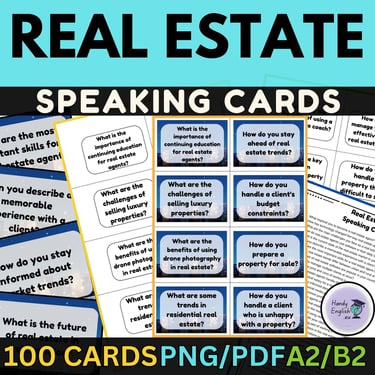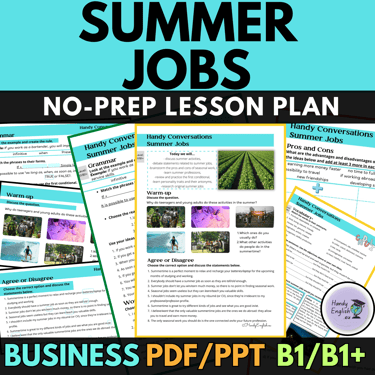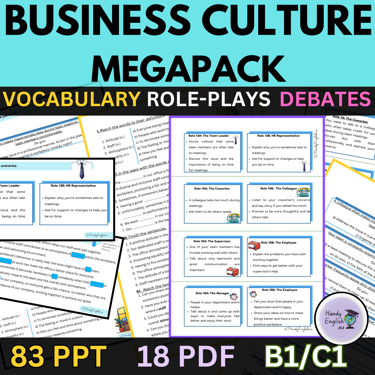[BLOG] Teaching Adults: Strategies and Insights #4 - Tailoring Business English Lessons
Learn how to create tailored, effective Business English lessons for adult learners by focusing on their real-world needs, industry-specific vocabulary, and workplace communication skills.
Kaya
8/23/2025
Please keep in mind that the opinions posted on this blog are my own.
Everybody might have a different experience and opinions, and that's OK.
Teaching Business English to adults isn’t about marching through a dry textbook filled with outdated office phrases like “enclosed please find” or “per my last email.” It’s about figuring out exactly what they need in their day-to-day work and shaping your lessons around that reality. No two jobs are the same, and no two students will use English in exactly the same way - which is why your role as a teacher is part detective, part coach, and part translator of “real world” workplace communication.
Start by Listening More Than Talking
Before you open a single PowerPoint, ask your student what their work looks like in English. Do they attend online meetings? Negotiate with suppliers? Send follow-up emails? Give conference presentations? The answers to these questions are your goldmine. Business English isn’t just “more formal English” - it’s highly situational, and your first job is to uncover those situations. Once you know them, you can build lessons that feel instantly relevant instead of generic.
Keep It Real - No Pretend Office Drama
Many adults roll their eyes at artificial “business scenarios” in coursebooks because they feel like role-playing a fake meeting about fictional paper suppliers in an imaginary city. Ditch the corporate soap operas and use their actual work situations. This could mean practicing negotiation skills with real contracts (minus sensitive details), rehearsing a sales pitch they’ll give next week, or editing real emails they’ve drafted. When they can immediately apply what they’ve learned, their motivation - and retention skyrockets.
Teach Beyond the Words
Business English isn’t just about vocabulary and grammar - it’s about cultural awareness, tone, and communication style. A CEO might need to learn how to be more direct in an American context, while a project manager might need to soften requests when writing to British colleagues. Helping them understand these nuances can be just as valuable as teaching the right idiom or phrasal verb. This is where your experience and cultural knowledge become a powerful part of the lesson.
Build in Industry-Specific Vocabulary
A marketing executive doesn’t need the same language as an insurance broker, and a hotel manager doesn’t need the same as an engineer. Take the time to research their industry and weave that vocabulary into your lessons. Yes, this means doing a little extra homework yourself - but it also makes you stand out as a teacher who’s genuinely invested in their success. And, let’s be honest, it’s kind of fun to suddenly know how to talk about logistics chains or dental procedures in English when that’s never been part of your life before.
Practice for the Pressure
One thing adult learners in business often face is performance under pressure. Whether it’s answering unexpected questions in a Q&A, jumping into a heated meeting, or explaining a technical concept to a non-expert, these situations require quick thinking in English. Creating simulated “stress practice” in class - like timed responses or challenging follow-up questions - prepares them for those high-stakes moments. The goal isn’t to make them panic; it’s to make them realise, “Oh, I can handle this.”
Wrap It Up With Feedback They Can Use Immediately
Adults, especially busy professionals, value feedback that is direct, actionable, and connected to their goals. Instead of just marking errors, point out patterns (“You tend to overuse passive voice in reports”) and offer clear alternatives. Then, watch how they apply that advice the very next day at work. Few things are more satisfying than getting a message from a student saying, “I used that phrase in my meeting today - and it worked perfectly!”
Tailoring Business English lessons is about more than simply swapping in a few industry terms. It’s about creating a learning experience so aligned with your students’ professional lives that they can walk out of class and immediately put it into practice. When you combine relevance, real-world application, and just the right amount of challenge, you’re not just teaching English - you’re helping them do their jobs better.






Get in touch!
Copyright Handy English 2021
”I used this with an adult ELL tutee of mine. I appreciate that the language was accessible for multiple proficiency levels, but the content wasn't obviously geared for children and still useful for older learners.”
August 7, 2023
”Another great resource from Handy English! I used it to give my students more in-depth practise into quantifiers and restaurant language. It's great resource and can be used after the students learn the basics of language for the restaurants and quantifiers. Definitely helped solidify what they learnt.”
February 5, 2023
”Love this resource. Great for fast finishers and also those in small ESL groups. Great for all macro skills as discussion and brainstorming is a great precursor for writing submissions.”
- Gail M.
June 25, 2023
Here's what other ESL Teachers say
Handy English: 4.8/5
”This was a wonderful resource for my students. It helped me introduce them easily to new concepts and it was quite engaging. Thanks!”
- Kiara B.
October 10, 2023
”Great resource for learning vocabulary, which supports comprehension and speaking skills.”
- Lori-Ann W.
September 29, 2023
”What a great way to get a healthy debate going. My students struggle with impulse control and they all have kept it kind and appropriate.”
- Alicia H.
September 17, 2023






